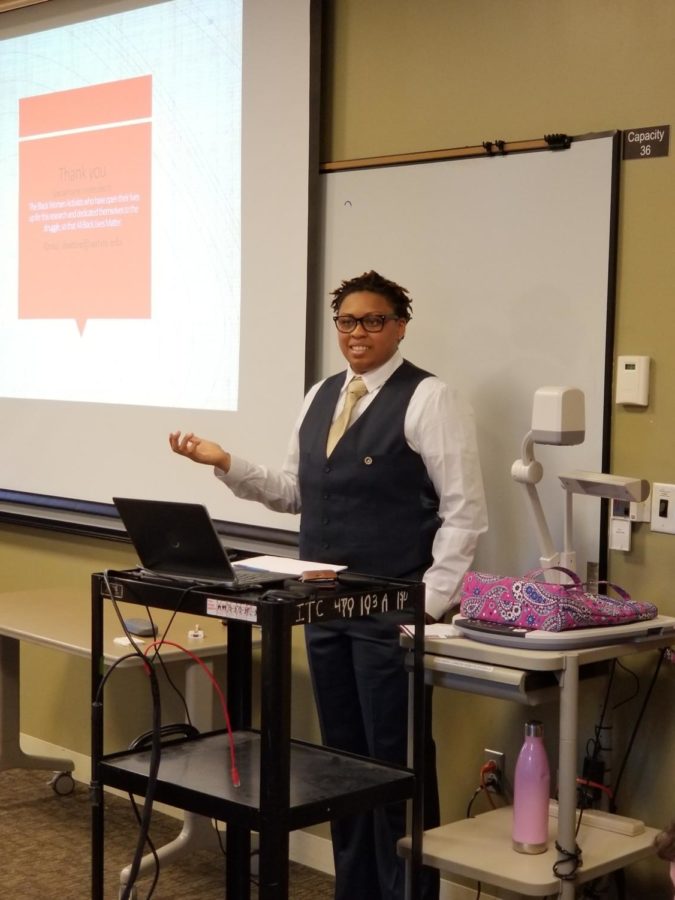Black movement actors discussed at WGS Seminar
Dr. Shaneda Destine asks for questions after her presentation.
Women’s and Gender Studies Seminar
March 1, 2018
“If we stop adjusting, and instead, get rid of capitalism, we’ll be at a better place,” Destine said.
Shaneda Destine presented “WGS Seminar – #sayhername: Black Women Movement Actors Moving from Race Consciousness to Class Consciousness” on Wednesday from 4 to 5 p.m. in 1030 Morrill Hall.
Shaneda Destine is a lecturer in the women’s and gender studies, African and African American studies and sociology at Iowa State.
Destine earned her bachelor’s in sociology at the State University of New York College at Old Westbury, her masters at Queens College in applied social research, and her doctorate in sociology and medical sociology from Howard University.
Important Definitions
Black women movement actors: black women engaged in protests, organizing, leadership, education and other struggles as a political movement for black life.
State Violence: umbrella term that encompasses police brutality and killings as sanctioned by the state.
Consciousness: Participants’ perceptions, experiences, reflection and understanding of the world.
“Consciousness does not determine life: life determines consciousness,” Destine quoted.
Say Her Name initiative documents stories of Black women who have been killed by police and focuses on forms of police brutality experienced by women of color.
The say her name hashtag was created in 2015 by the African American Policy Forums. The AAPF was founded in 1996 that works to connect academics with activists to dismantle structural inequality.
In her research, Destine interviewed 30 Black women movement actors from the Baltimore and Washington DC area from September to December of 2016.
Throughout the speech, Destine posed three research questions. How do black women movement actors experience and understand police violence and killings, how do black women movement actors struggle against police violence and express their agency and what is the vision of black women movement actors for their political work and long-term strategies.
Within these interviews, Destine found perceived root-causes of police violence, state sexual violence and intimidation, lessons learned from the Civil Rights Movements and intergenerational connections to social movements and global coalition building.
To talk about each of these research questions, Destine used direct quotes from interviews with activists that she interviewed.
“Sometimes, the [New York Police Department] can become flirtatious with women. I noticed this a lot, like where I was from, it was subtle, but it was kind of like sexist and I notice with men, they’re a lot more aggressive, like they’re just forceful,” Scarlett said in Washington DC.
Depending on the years of experience in activism, the women’s answers differed, especially when it can to the long-term strategies and work.
According to Destine, black women movement actors that had more experience, seek to break down the society that they believe is not made for men and women of color. Actors that were not as seasoned, seek more political action, such as better police training or different policies.
“If we stop adjusting, and instead, get rid of capitalism, we’ll be at a better place,” Destine said.
Through these interviews, Destine found that most of the black women movement actors had a very strong race consciousness, but the more seasoned activists had class consciousness.
In future research, Destine stated that she would like to expand the definition of state violence, gain a more operational definition of class consciousness, and talk to more activists that are the leaders and organizers of these movements and protests.
















